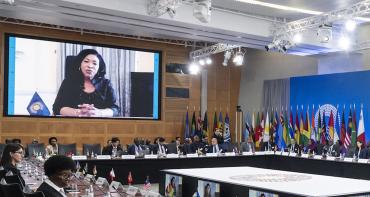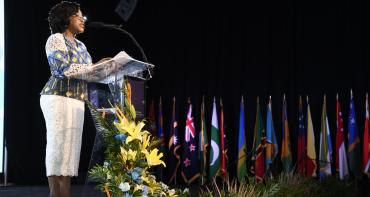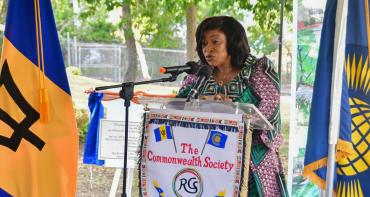Addressing a major United Nations conference in Geneva, Secretary-General Scotland pledged the Commonwealth’s commitment to support the United Nations Plan of Action to Prevent Violent Extremism.
Commonwealth Secretery-General on preventing violent extremism
If the world is to prevent the spread of violent extremism, global efforts need to focus on early intervention, supporting women and children and improving our understanding of the phenomenon, Commonwealth Secretary-General Patricia Scotland QC has said.
Addressing a major United Nations conference in Geneva, Secretary-General Scotland pledged the Commonwealth’s commitment to support the United Nations Plan of Action to Prevent Violent Extremism.
“There can be no greater responsibility than ensuring the safety and security of our citizens,” said the Secretary-General, as she outlined her vision for the Commonwealth’s own action plan, involving the development of alternative narratives and dialogue, empowering young people, harnessing the power of education and the media, and building an environment that supports good governance, human rights and the rule of law.
“The changing nature of violence in today’s world is alarming, and it affects us all. I believe this starts with women and children. That means we need to start in the home and in schools,” she said, emphasising the need to gather empirical data and to break down silos.
“Education about the other, teaching that difference is something to celebrate and not to fear, this needs to start in primary schools,” she stressed. The Commonwealth has a long-track record in supporting young people, she added. “But this work needs to start earlier and younger than it traditionally has.”
“Such interventions enable mothers and young people to address social exclusion, ethnic or religious prejudice, and politically-motivated violence at grassroots where they can be potent catalysts for inclusion and help avert alienation.”
The Commonwealth’s Plan of Action to Prevent Violent Extremism will cover four strands, including the development of alternative narratives and dialogue “so all Commonwealth citizens can be part of the solution,” and helping member countries with good governance, human rights protection and the rule of law, said the Secretary-General in her speech.
The plan will also embrace the power of education and the media to promote greater respect and understanding among communities, and empower young people “to be positive agents and role models in our societies”, she said.
“By promoting alternative narratives, strengthening justice institutions, and building platforms for dialogue, the Commonwealth way is always to encourage positive engagement. Violence can be defeated, but we need the widest and most inclusive alliances of government, international agencies, civil society organisations, private sector actors, legal bodies, educators, youth workers and healthcare professionals,” she said.
The ‘Geneva Conference on Preventing Violent Extremism – The Way Forward’, co-hosted by the Government of Switzerland and the United Nations, is taking place between 7 and 8 April 2016. It was organised to help the international community to share experiences and good practices.
Day two of the conference saw interventions by government ministers, heads of international and regional organisations and heads of UN agencies, following a meeting of senior experts yesterday. The United Nations Plan of Action to Prevent Violent Extremism was developed by the UN Secretary-General and endorsed by the UN General Assembly on 12 February 2016.
In November 2015, Commonwealth Heads of Government in Malta agreed to establish a dedicated unit within the Commonwealth Secretariat to strengthen national, regional and global action on preventing violent extremism. This builds on past work including the publication of the report, Civil Paths to Peace.
In her speech, the Secretary-General also outlined the Commonwealth Secretariat’ collaboration with UN Women on supporting legal decision makers on cases of violence against women. “Because if there isn't peace in the home, there cannot be peace in our world,” she said.
Notes to Editors
Watch the Secretary-General’s address to the UN conference on 8 April 2016



